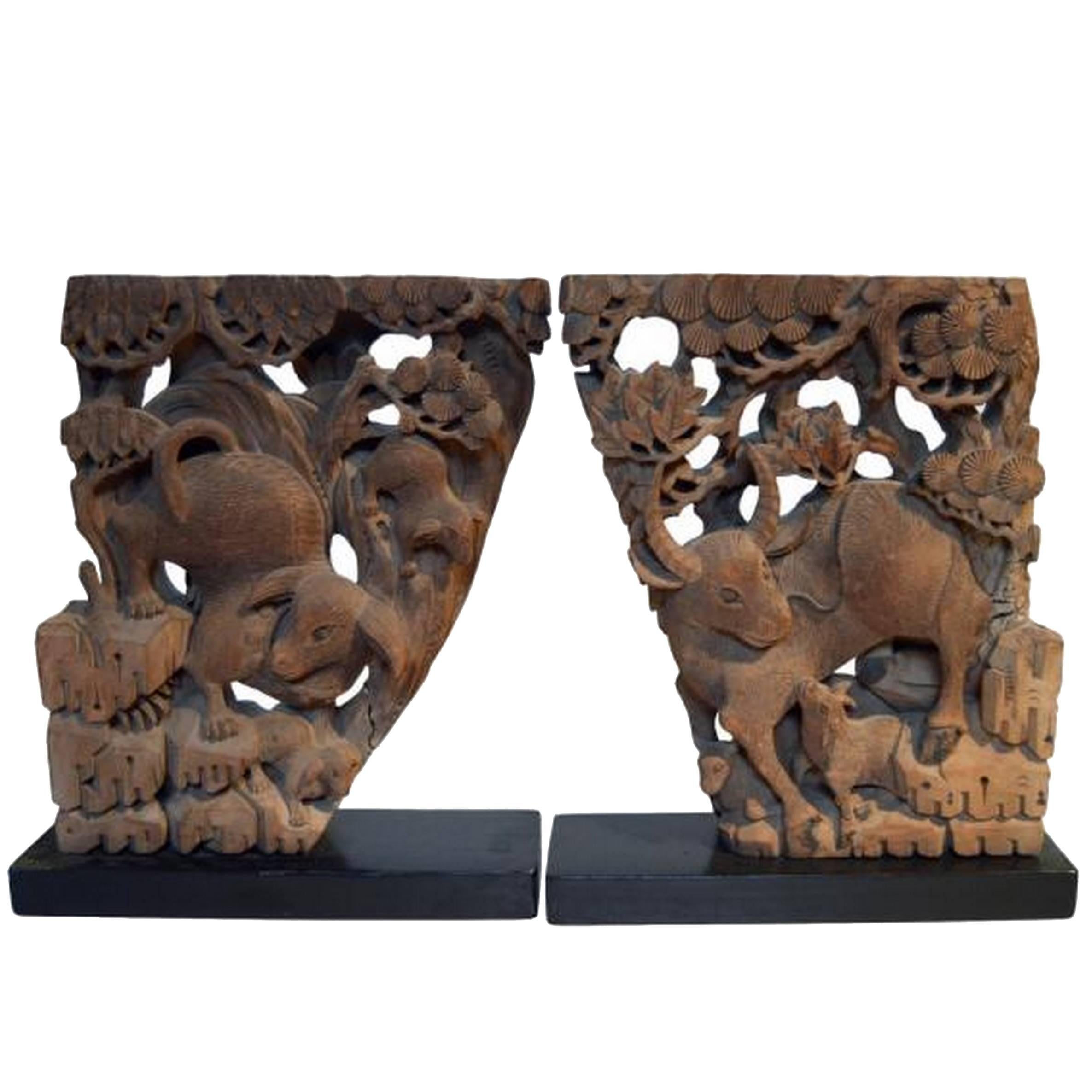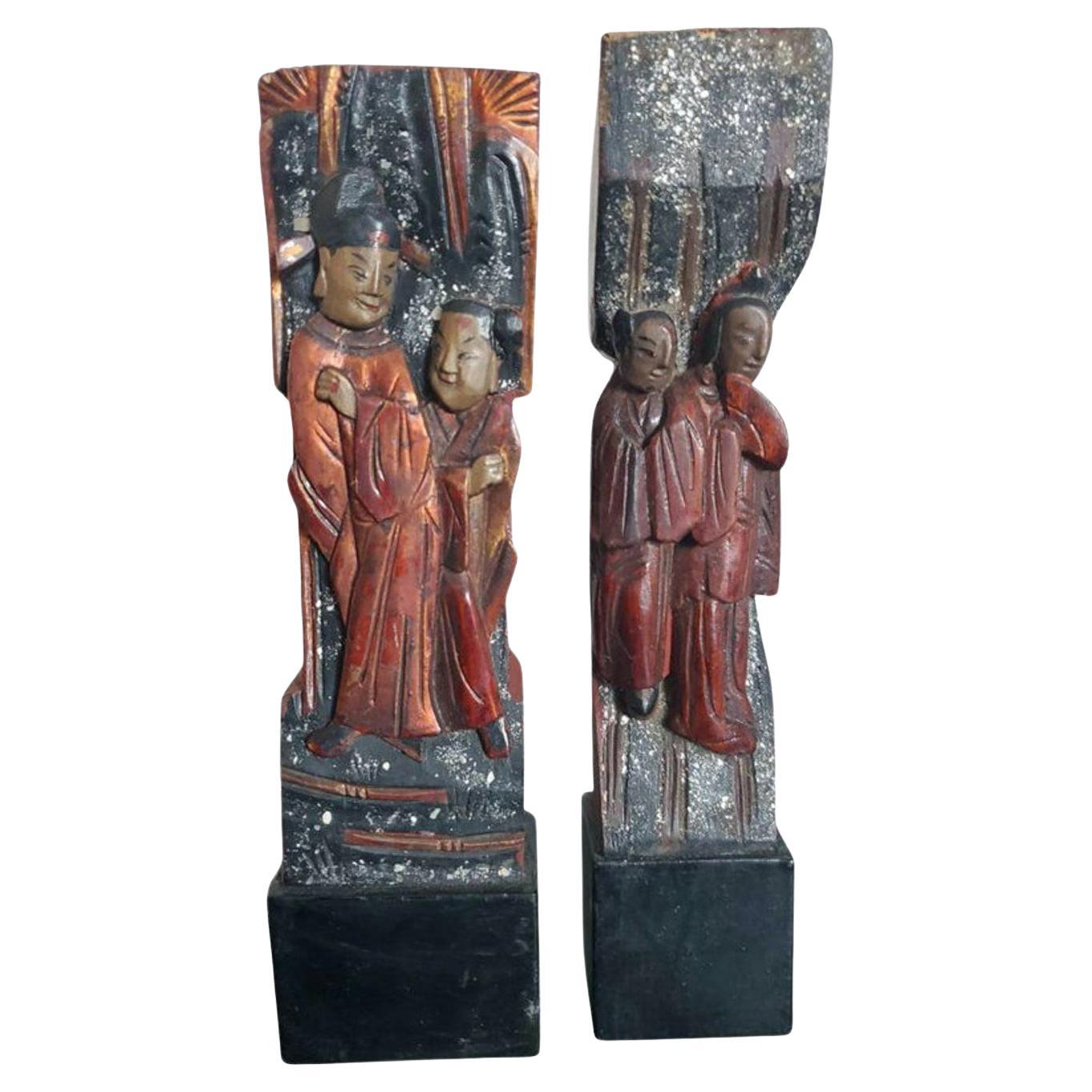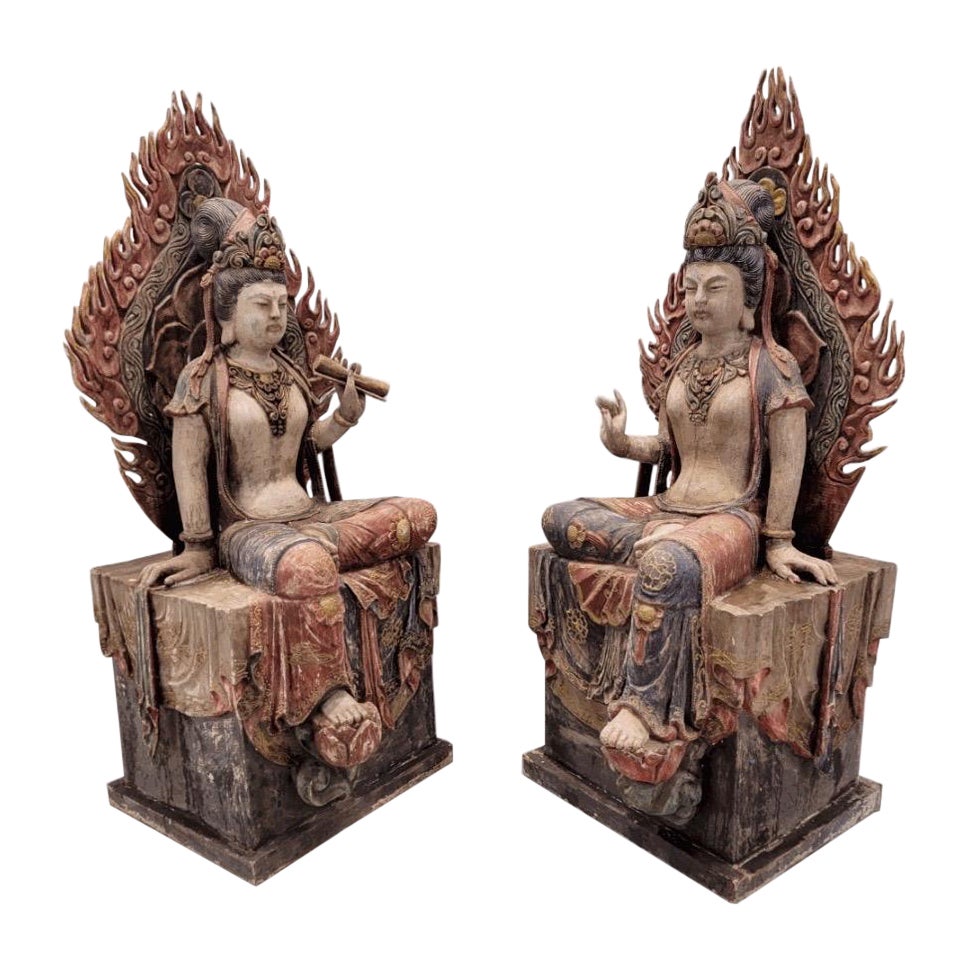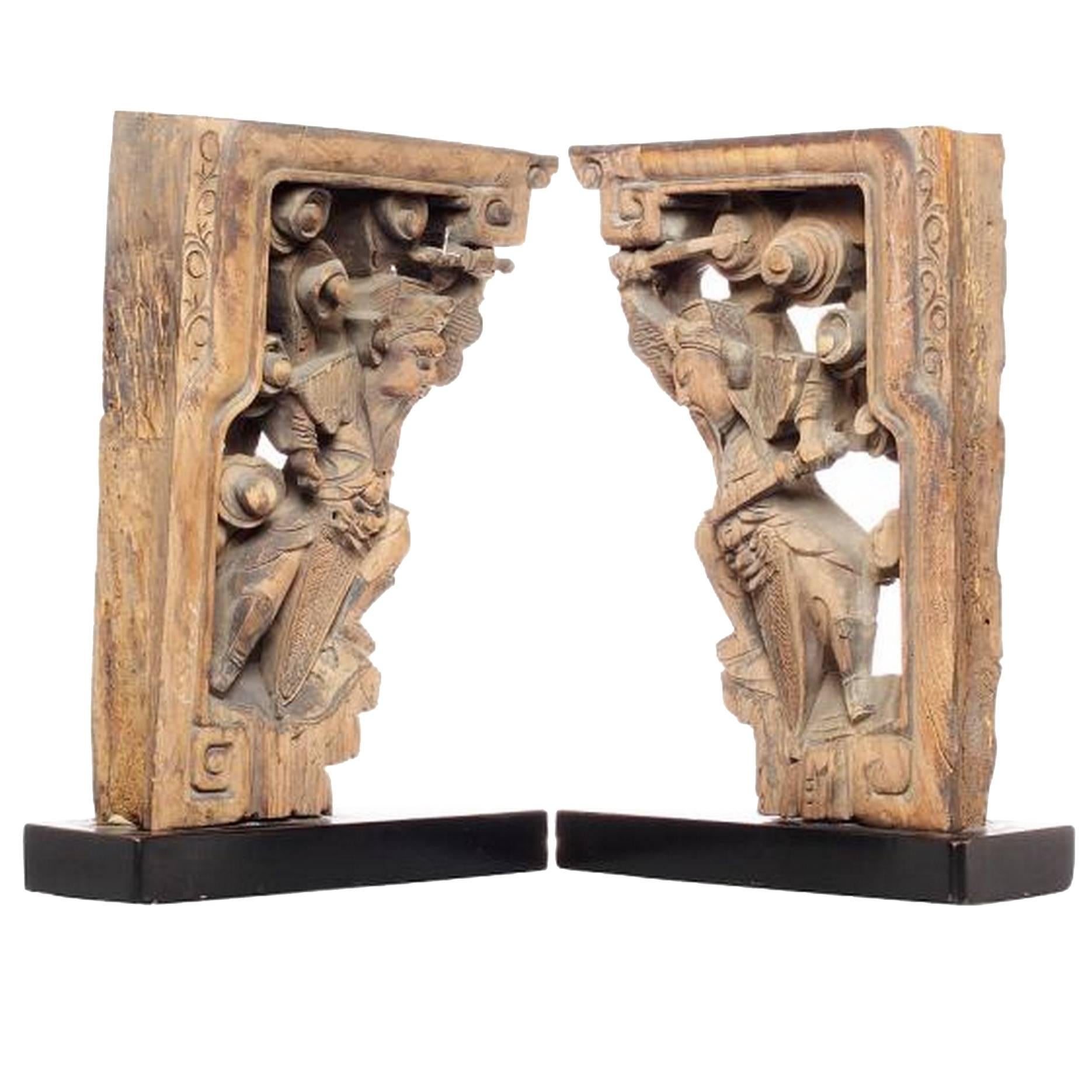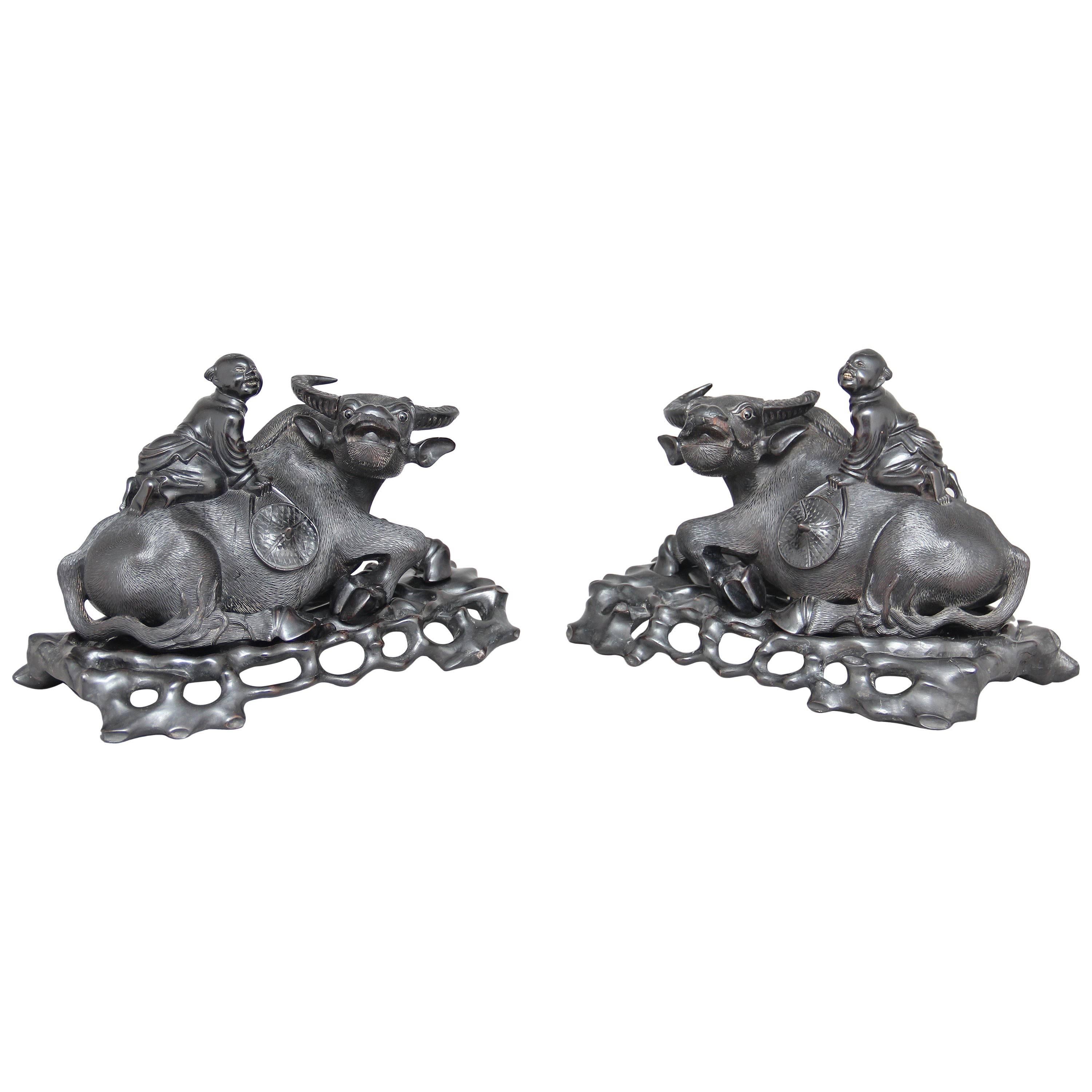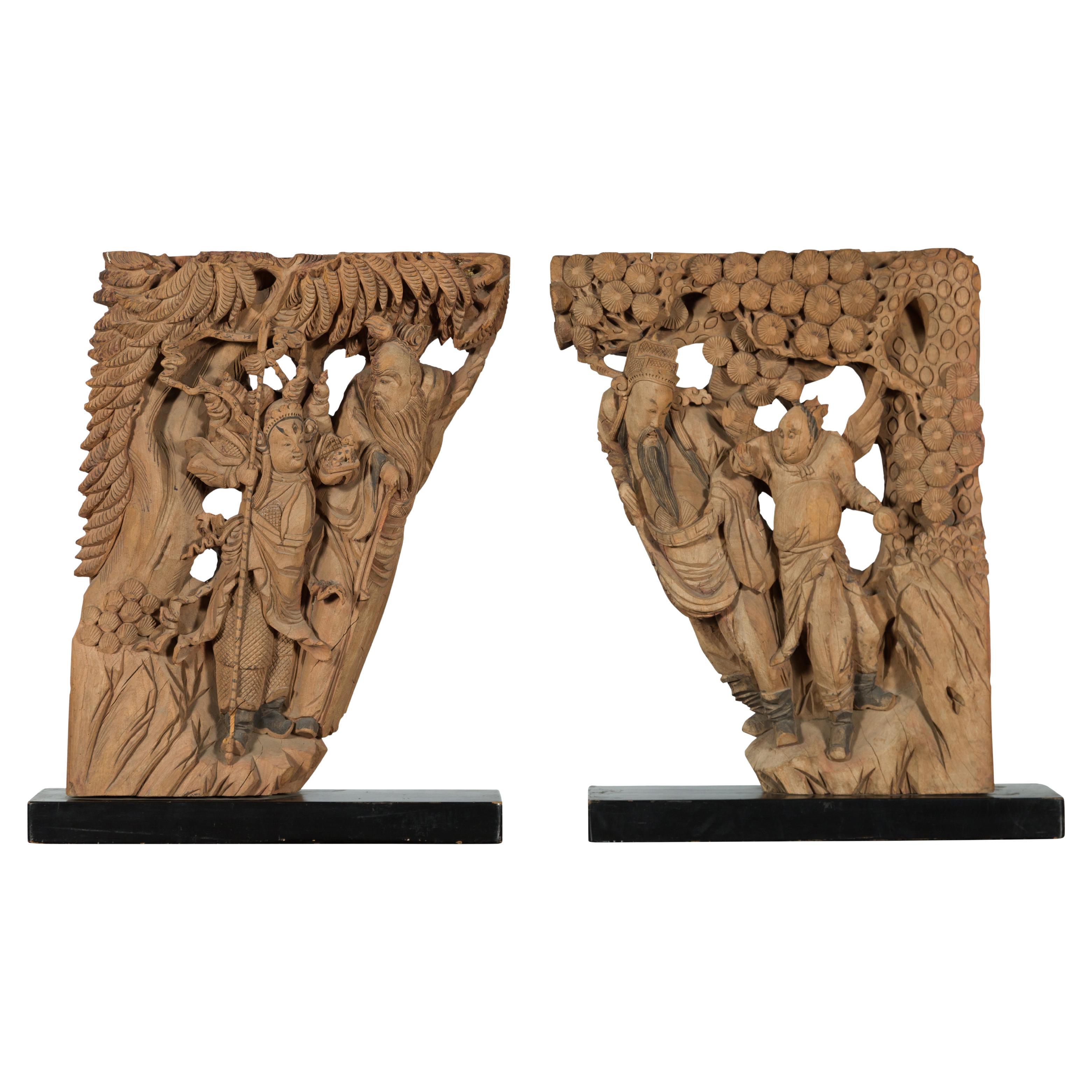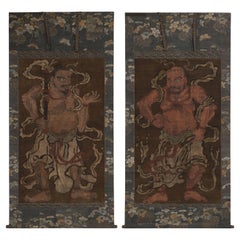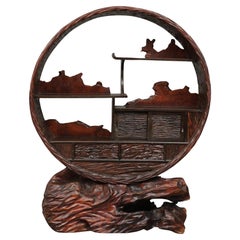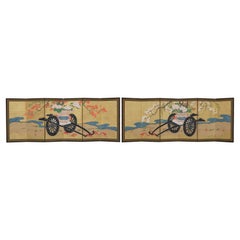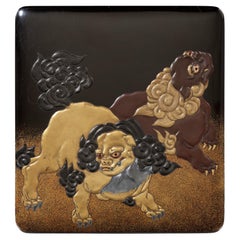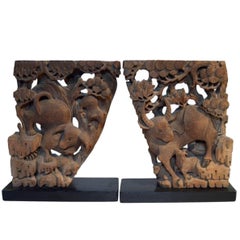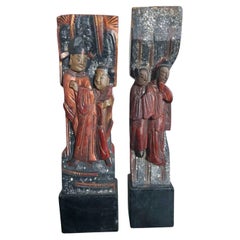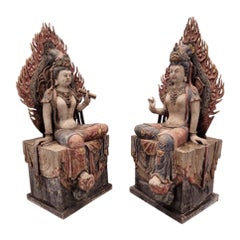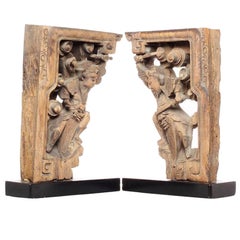Items Similar to Pair of Japanese Carved Wooden Temple Ornaments 木鼻 'Kibana' Shaped like Baku 獏
Want more images or videos?
Request additional images or videos from the seller
1 of 16
Pair of Japanese Carved Wooden Temple Ornaments 木鼻 'Kibana' Shaped like Baku 獏
$3,832.77per set
£2,840.29per set
€3,200per set
CA$5,232.46per set
A$5,820.89per set
CHF 3,051.38per set
MX$71,129.89per set
NOK 38,855.58per set
SEK 36,577.15per set
DKK 24,364.52per set
Shipping
Retrieving quote...The 1stDibs Promise:
Authenticity Guarantee,
Money-Back Guarantee,
24-Hour Cancellation
About the Item
A lovely pair of very detailed carved wooden temple ornaments (kibana) in the shape of elephant-like mythical creatures known as ‘Baku’.
Baku are Japanese supernatural beings that are said to devour nightmares. These creatures have the trunk and tusks of an elephant, the eyes of a rhinoceros, the tail of a cow, and the paws of a tiger.
Kibana are ornaments placed at the top of pillars or at the corners of beams in a temple so they could serve as guardians of the temple. The last photo is an example of how similar kibana originate.
One baku has its mouth open while the other’s is shut. As a part of Buddhist symbolism the open mouth is meant to be forming the sound “a”, while the closed mouth is forming the sound “un”. Combined, they form the word a-un. “a” and “un” are symbolic of all beginnings and endings.
Legend has it that a person who wakes up from a bad dream can call out to baku. A child having a nightmare in Japan will wake up and repeat three times, "Baku-san, come eat my dream." Legends say that the baku will come into the child's room and devour the bad dream, allowing the child to go back to sleep peacefully. However, calling to the baku must be done sparingly, because if he remains hungry after eating one's nightmare, he may also devour their hopes and desires as well, leaving them to live an empty life. The baku can also be summoned for protection from bad dreams prior to falling asleep at night.
When shipped we will add a certificate of authenticity.
Price including insured shipping.
- Dimensions:Height: 12.6 in (32 cm)Width: 8.08 in (20.5 cm)Depth: 19.3 in (49 cm)
- Sold As:Set of 2
- Materials and Techniques:
- Place of Origin:
- Period:
- Date of Manufacture:1600-1868
- Condition:Wear consistent with age and use. In a very nice original condition with wear consistent with age. Please look at the photos for a condition reference.
- Seller Location:Amsterdam, NL
- Reference Number:Seller: T21911stDibs: LU7165233265332
About the Seller
4.8
Vetted Professional Seller
Every seller passes strict standards for authenticity and reliability
Established in 1996
1stDibs seller since 2022
22 sales on 1stDibs
Typical response time: 22 hours
- ShippingRetrieving quote...Shipping from: Amsterdam, Netherlands
- Return Policy
Authenticity Guarantee
In the unlikely event there’s an issue with an item’s authenticity, contact us within 1 year for a full refund. DetailsMoney-Back Guarantee
If your item is not as described, is damaged in transit, or does not arrive, contact us within 7 days for a full refund. Details24-Hour Cancellation
You have a 24-hour grace period in which to reconsider your purchase, with no questions asked.Vetted Professional Sellers
Our world-class sellers must adhere to strict standards for service and quality, maintaining the integrity of our listings.Price-Match Guarantee
If you find that a seller listed the same item for a lower price elsewhere, we’ll match it.Trusted Global Delivery
Our best-in-class carrier network provides specialized shipping options worldwide, including custom delivery.More From This Seller
View AllPair of Japanese kakejiku 掛け軸 (hanging scrolls) depicting Niô guardians 仁王
Located in Amsterdam, NL
Pair of impressive, antique kakejiku (hanging scrolls) showcasing the awe-inspiring Niô guardians, also referred to as heavenly kings.
Each painting cap...
Category
Antique Early 18th Century Japanese Paintings and Screens
Materials
Brocade, Silk, Paint
$16,768 / set
Free Shipping
Japanese round wooden cha'dansu 茶箪笥 (tea cabinet)
Located in Amsterdam, NL
A remarkable round cha'dansu (tea cabinet) crafted from a hollowed tree trunk, resting on an organically shaped three-root base.
The exterior showcases a striking natural texture, e...
Category
Early 20th Century Japanese Furniture
Materials
Wood
Pair of Japanese hinagata byôbu 雛形屏風 (small folding screens) with flower carts
Located in Amsterdam, NL
An amazing pair of six-panel hinagata byôbu (doll festival folding screens) with a continuous painting on gold leaf showcasing flower carts (hana’guruma) at the edge of a winding river.
Both laden with a large bamboo basket...
Category
Antique Early 19th Century Japanese Paintings and Screens
Materials
Gold Leaf
$4,311 / set
Free Shipping
Japanese lacquer suzuri’bako 硯箱 (writing box) with shishi & Hotei design
Located in Amsterdam, NL
A captivating lacquer suzuri’bako (writing box) of rounded rectangular form depicting a pair of shishi (temple lions) and the lucky god Hotei 布袋 on a rôiro...
Category
Antique Early 19th Century Japanese Lacquer
Materials
Gold Leaf, Silver Leaf
Japanese Bronze Okimono of a 'Karasu Tengu' 鴉天狗 Holding Up a Flower Branch
Located in Amsterdam, NL
Very refined Japanese bronze figure of a ‘karasu tengu’ holding a candlestick.
Well cast as a tengu in half-human, half-bird form standing atop a pile of leaves on a rounded square ...
Category
Antique Late 19th Century Japanese Metalwork
Materials
Bronze
Japanese Sado ishô dansu 衣装箪笥 (cabinet of drawers) with elaborate hardware
Located in Amsterdam, NL
Exceptional, rare and completely restored wooden Sado ishô dansu (cabinet of drawers) with elaborately decorated open work iron hardware, in two sections. Fully restored, cleaned and waxed.
The exterior is made of hinoki cypress wood. Only slightly varnished, giving it a tad warmer colour. This soft underground lets the refined hardware stand out even more.
The upper part consists of two large drawers. The lower part with two drawers of different size and a hinged door. The interior behind the door with three small drawers. All the drawers are very deep and have a lot of volume, for easy storage. They run very smoothly as well.
The cabinet has extensively decorated hardware. The corner pieces of the drawers with stylized pine trees. The large decorative lock plates each with their own unique design of different auspicious animals; a peacock, a phoenix, a crane and a minogame. The hinged door decorated with different attributes of the Seven Gods of Fortune...
Category
Antique Late 19th Century Japanese Furniture
Materials
Iron
You May Also Like
Pair of Antique Hand-Carved Wood Temple Corbels from 18th Century, China
Located in Yonkers, NY
A pair of Chinese 18th century hand-carved wooden temple corbels. Each corbel features detailed animals, shells, and other adornments among openwork fol...
Category
Antique 18th Century Chinese Antiquities
Materials
Wood
Pair of Qing Dynasty Chinese Religious Temple Architectural Ornament
Located in Forney, TX
A scarce pair of Qing Dynasty temple architectural ornaments, the decorative antique building element fragments each elaborately hand carved, polychrome painted and lacquered, richly detailed featuring two figural pairs accented...
Category
Antique Early 19th Century Asian Folk Art Architectural Elements
Materials
Mother-of-Pearl, Wood, Lacquer, Paint
Antique Monumental Chinese Mandorla Carved Sculpted Statues - Set of 2
Located in Chicago, IL
Antique Monumental Chinese Quan-Yin Sitting Mandorla Carved Polychromed Wood Sculpted Statues - Set of 2
This set of two antique monumental Chinese Quan-Yin sitting mandorla carved ...
Category
20th Century Chinese Other Sculptures and Carvings
Materials
Wood, Paint
Pair of 19th Century Chinese Hand-Carved Temple Corbels with Characters
Located in Yonkers, NY
A pair of 19th century Chinese hand-carved temple corbels featuring stylized characters. Each corbel showcases a great wood openwork carving featuring a...
Category
Antique 19th Century Chinese Antiquities
Materials
Wood
Pair of 20th Century Chinese Wood Carvings
Located in Martlesham, GB
A pair of 20th century Chinese wood carvings of a boy on the back of a water buffalo holding a hat, the water buffalo standing on the original carv...
Category
Vintage 1930s Sculptures and Carvings
Materials
Hardwood
Pair of 19th Century Chinese Qing Dynasty Hand-Carved Wooden Temple Corbels
Located in Yonkers, NY
A pair of Chinese Qing Dynasty period hand-carved temple corbels from the 19th century, mounted on black bases. Created in China during the Qing Dynasty...
Category
Antique 19th Century Chinese Qing Figurative Sculptures
Materials
Wood
$6,400 Sale Price / set
20% Off
More Ways To Browse
Ship Wood Carving
Carved Wood 19th Century Japanese
Antique Wood Pillars
Hand Carved Wooden Ships
Carved Beam
Japanese Wood Temple
Carved Cow
Temple Japanese Buddhist
Japanese Tiger
Japanese Buddhist Sculpture
Temple Guardian
Temple Ornament
Japanese Temple Sculpture
Japanese Trunk
Elephant Carving
Ships Trunk
Tusk Sculpture
Hand Carved Wood Elephants
